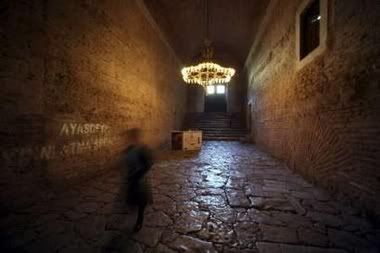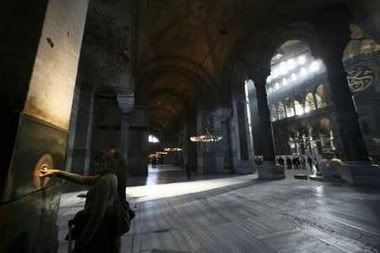
The dark alley of the Turkish Soul
A visitor walks through an alley at the sixth century Byzantinian monument of St Sophia in the old city of Istanbul November 16, 2006. The place was once a church in the Byzantinian era that turned into a mosque during the Ottoman empire and now is now a museum. REUTERS/Fatih Saribas (TURKEY)
The enigmatic Spengler of Asia Times Online revisits the novel Snow by Orhan Pamuk. The title of Spengler's essay is 'The fallen bridge over the Bosporus' and it is an apt one. He writes:
Not since Boris Pasternak refused the Nobel Prize for literature in 1958 has a Nobel laureate regarded the award with such mixed feelings as Turkish novelist Orhan Pamuk. He set out to be a political dilettante, as befits a postmodern European novelist, and to his profound consternation has had to become a man of principle. That in no way diminishes the poignancy of Pamuk's position, but it makes him more interesting than the average martyr, in a postmodern sort of way.
[...]
During a June 2004 visit to Turkey, US President George W Bush offered:The Turkish writer Orhan Pamuk has said that the finest view of Istanbul is not from the shores of Europe, or from the shores of Asia, but from a bridge that unites them, and lets you see both. His work has been a bridge between cultures, and so is the Republic of Turkey. The people of this land understand, as that great writer has observed, that "what is important is not [a] clash of parties, civilizations, cultures, East and West". What is important, he says, is to realize "that other people in other continents and civilizations" are "exactly like you".
The bridge has fallen, leaving Pamuk gasping for breath on the Western shore. Turkey's Western loyalties were founded upon a secular nationalism that sought to bury Islam under modernizing reforms. Pamuk's theme in Snow is the horrible emptiness of secular Turkey, with its poverty, inertia, bureaucratic sclerosis and official brutality. Thoroughly secular in upbringing and outlook, Pamuk nonetheless evinces profound sympathy for the Islamic loyalties of the Turkish poor, as well as the terrible attraction that political Islam holds for Turkey's disappointed elite.

From where will the light come?
No comments:
Post a Comment